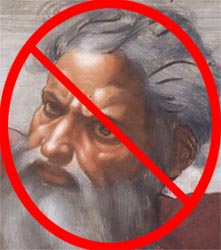|
by D.M. Murdock (Acharya S) Freethought Examiner August 17, 2009 from Examiner Website
Part 1
There has been a great deal of debate in the media lately concerning the "New Atheism" as led by "atheist gods" such as Richard Dawkins, P.Z. Myers, Sam Harris and Christopher Hitchens.
This notoriety has been enhanced by Dawkins & Co.'s infamous "bus ads," as well as the "Imagine No Religion" billboards by the Freedom from Religion Foundation headed by Dan Barker and Annie Laurie Gaylor. Then there is the little chat between famous atheists Bill Maher and Brad Pitt that is kicking up controversy, along with a number of other "stars" expressing their unbelief.
We also read reports that atheism is on the rise in the United States, reaching percentages never recorded before.
Richard Dawkins &
London Bus Campaign
Truly,
atheism is out of the closet.
This fact alone is enough to create atheists. When we read
stories about horrible things happening to innocent people and
animals or - God forbid - see these atrocities with our own
eyes, who with any honesty and a conscience is not inclined to ask,
how can there be any good god in charge of this mess?
If God is all powerful, how can
the Devil constantly be getting the better of him? And God acting
mysteriously without letting us - his purported "children"
- in on the
secret hardly speaks of a good character we should all admire,
especially when his mysterious ways are causing misery and
suffering. Would a terrestrial father who behaved in such a manner
deserve any kind of respect and admiration? No!
To not be able to question accepted beliefs such
as a giant all-knowing, all-powerful and ever-present being in the
sky - as we find especially in monotheistic religious
ideologies - represents utter dishonesty and should serve as an
example of the exact opposite of a real "religious" experience.
In this regard, atheism certainly provides the answer to the
dishonesty and depravity of organized religion that does not allow
human beings to think for themselves, to reason out difficult issues
and to not believe in the thousands of gods - including the
monotheist
god of the Abrahamic faiths - that man has created in his own image.
The
protection and rehabilitation of atheistic inclinations can only
improve the human lot. In this regard, atheism clearly provides a
much needed aspect of the human experience.
Not long ago, fear of being physically assaulted or losing one's occupation was enough to prevent this expression of the atheistic aspect of the human mind. With the advent of truly free communication via the internet, the repressed atheistic thinking is now bursting forth and using its voice with a vengeance. Again, entirely understandable - and necessary. In that regard, our society is much improved by the ability to enunciate unbelief in safety.
But, also again, is
atheism in and by itself the ultimate answer to the world's
psychological, spiritual and emotional concerns?
August 24, 2009
Last week in the first part of this series, I made the case for atheistic thinking as a natural part of the healthy human mind. I did not, however, draw any firm conclusions as to whether or not atheism as a worldview is a solution to many of society's ills, including and especially religious fanaticism.
Indeed, the question remains, is atheism
even a worldview?
Mostly, however, these comments have been thoughtful, rational and profound. The most evident concern from these remarks is the need for a clear definition of "atheism" in the first place.
Part 1 did not define atheism per se but, rather, hinted at a proper definition by using carefully chosen words and phrases, such as "unbelief/disbelief in a god," rather than "belief in no god" or "doesn't believe in God." The distinction appears slight, but it is at the heart of a fierce debate concerning atheism, which is whether or not it in itself is a belief system or "religion," as some have ironically claimed.
In view of the seemingly monolithic and frequently fanatical "New Atheist" movement we see all over the place, it is easy to perceive atheism as a belief system or worldview, complete with dogma and doctrine.
Photo: Freethoughtpedia.com This perceived atheistic agenda has too often been expressed as rabidly skeptical and obnoxiously derogatory towards everything beyond the three dimensions and five senses.
It is precisely this rabidly skeptical and obnoxiously derogatory attitude that has created a great deal of resentment towards atheism and that has caused it to be viewed as a "religion" or "cult" in itself.
While it is clear why devout theists
would not want to be in the atheist camp, club, clique or gang - and
all of these things atheism has unfortunately become - there are many
millions globally who wish neither to believe in the fantastic
fairytales and fabulous cultural artifacts of the organized
religions nor to adhere to a rigidly materialistic and unspiritual
perspective of reality, such as too frequently is exemplified by
those who call themselves atheists.
In fact, in ancient Greece to be atheos could mean not only "atheist" but also "abandoned by the gods," with the presumption that such gods exist. In any event, "atheism" can be defined simply as a lack of belief in a god, whatever god, goddess, daemon or deity in question.
For example, when it comes to the Pagan
gods, all Christians are atheists, as they were deemed in ancient
times as well, and so on as applies to other faiths.
While atheistic thinking rates as a vital part of the human psyche, atheism by itself can only go so far in solving the world's problems stemming from religious fanaticism, because it is in fact not a worldview.
Along with atheism is needed additional understanding, but what would that be?
September 17, 2009
In continuing this series, I decided to let the dust settle a bit, as I took a break to work on other projects.
To recap my previous essays on this subject, Part 1 of "Is atheism the answer?" made the case that atheism is a necessary aspect of the healthy human thought process and that such atheistic thinking is logical under various circumstances.
In Part 2 of this series, I provided a basic definition of atheism as "without a god," which in essence means that atheism is not precisely a worldview or ideology in and of itself, and thus does not serve - as many people opine - as a belief system that is against God. From the comments here and elsewhere, proceeding with this series requires me to address the oft-heard contention that atheism contributes to immorality and has allowed for tremendous atrocity, including genocide.
I have already briefly explored in another article the claim that religion causes immorality, but,
Abused by religion?
That being said, although my church and
family did not engage in them directly or abuse me specifically with
them, general attitudes in the public at large produced by the
religion du jour in my location - Christianity - definitely did
affect me.
Again, this negative mentality born of religious dogma certainly did affect me, as it did practically everyone I knew in my area growing up. Also again, my formative years were spent in a very secular time and place, when and where people hardly spoke about religion, church, Jesus, God, etc.
These attitudes nevertheless pervaded writings and populated the airwaves, especially TV and radio, even though there were very few stations and no one I knew was listening specifically to Christian programming, which we barely heard of at that time.
On TV, there were the Big 3 networks and
PBS, and on radio, Rock and Roll.
Atheists too like to hold up the clever
assessment by non-believing writer and scientist Isaac Asimov that
reading the Bible itself creates atheists, for example.
Therefore, it is to this debasement of humanity in general by religion that we may look for the cause of much turmoil, including that of the past century, which is held up as a black mark against atheism because of such figures as Josef Stalin, Adolf Hitler and Pol Pot. A common argument against atheism is that these individuals were all atheists who wrought horrendous atrocities against vast numbers of people.
While this latter contention of these individuals committing infamy is certainly true and should never be forgotten or whitewashed,
Infamous atheists?
Josef Stalin's "very religious" mother named him after St. Joseph, and wanted him to become a priest.
Stalin himself supposedly claimed that his father had been a priest, and he was purportedly "damaged by violence" while being "raised in a poor priest-ridden household." As a youth, Stalin spent five years in a Greek Orthodox seminary, after which he purportedly renounced his religion. In his later years, Stalin apparently embraced Christianity once more.
As Stalin biographer Edvard Radinsky remarks,
Radinsky likewise chronicles a number of
religious comrades in Stalin's immediate circle. It is evident that,
whether for good or bad, religion played a significant role in
Stalin's life.
In his autobiography Mein Kampf
(1.2), Hitler stated:
In this regard, Dr. Ian Harris, a Reader in Religious Studies at the University College of St. Martin, relates:
Although in comparison to the Abrahamic
religions its history is far less violent, Buddhism has not been
entirely devoid of atrocity in its spread and practice.
Hitler, who was also fascinated by
mysticism, could not be deemed an "atheist" by any scientific
standard, and Pol Pot also was not raised an atheist in a vacuum
devoid of religion but was obviously affected and motivated by it.
October 10, 2009
And that is precisely the reason I am
writing this series, which I thought might end with this entry but
which may be continued...
What I have really been expressing in this series, then, is my perspective of reality, the one I have been living my entire life, which is quickly becoming substantial in longevity, experience and interpretation.
In other words, I've been around a while
now, and I know who I am.
In some subjects, such as brain surgery,
I am agnostic, while in others I am gnostic, which means "one who
knows."
That is how my mind works - that is how I
define free-thought. I know myself, and it is futile to tell me
otherwise, which some have tried to do, including using invectives
and mind-games.
They must make disparaging comments, essentially attempting to insult others into their viewpoints. If you peruse this series of articles as well as others I have written here on atheism, you will see that there are a number in which both theists and atheists feel the need to inform me that my perspective is lacking in some manner, to put it mildly, because I do not see things their way.
I would wager that I am not alone, but
we do not hear as much from this "excluded middle."
Each human being is endowed from birth, hopefully, with the ability to think freely.
However, external factors constantly shape the way he or she does think eventually - and here, of course, is where religion comes in very heavily, as religion is a brainwashing, mind-control tool par excellence, and its purveyors know that fact very well. In order truly to be freethinkers, then, we need to break through the religious conditioning to determine whether or not any of it represents the truth.
Our exploration of religious ideation, however, need not lead to the complete dismissal of it, as in a remark oft-heard in atheist circles:
While I as a freethinker do not find myself subscribing to much religious ideology, I absolutely disagree with the contention that "religion is all bunk."
That statement is completely inaccurate,
and here is where I do not find myself in that particular
unbelieving camp. My free-thinking perspective allows me to enjoy
religion - when I know its true roots, of which too many people are
unaware - without being a subscriber to it or a believer in its gods.
In other words, while atheists complain that powerful theists such as clergy and politicians are nasty and despotic, and hence theism must be destroyed, we do not want to replace one unpleasant and tyrannical mind-control agency with another.
If your perspective of reality as manifested on a daily basis in your interactions with others is hostile, aggressive and selfish, whether you are a theist or an atheist, your mindset is not an improvement over what we already find dominant.
Fanaticism and extremism in any ideology
is not the answer.
|



